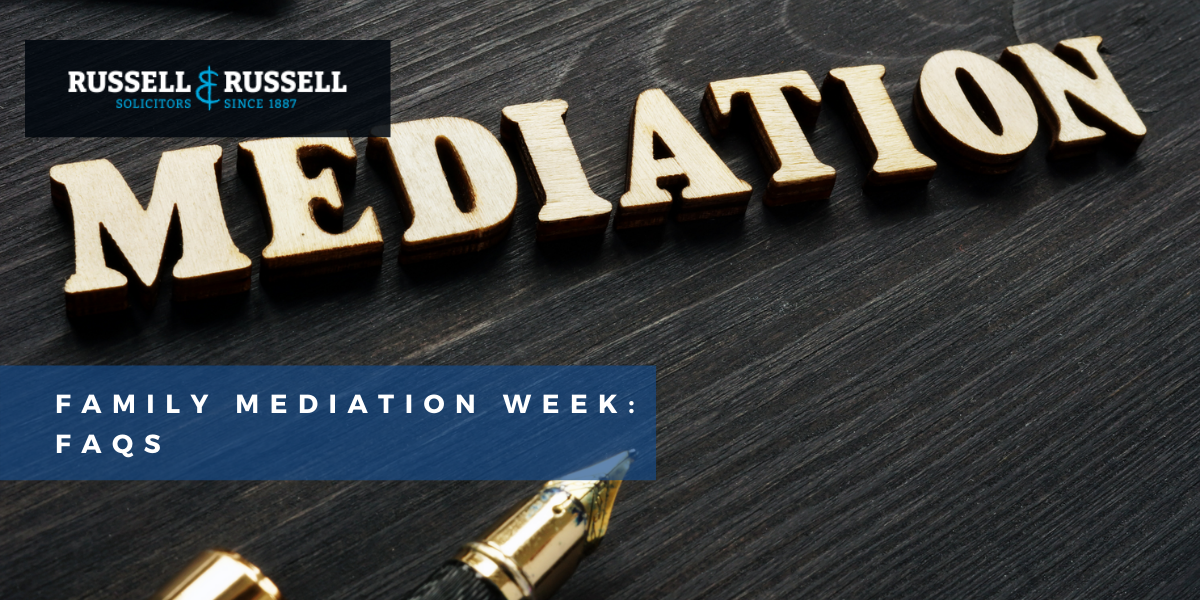20/01/2021

January is the most common time of year for relationship breakdown and separation. It is thought this is due to the stress of the holiday period and ‘trying to keep the peace’ through this time finally cracks. Of course, this year the covid-19 pandemic and prolonged lockdown periods have only increased the strain on many relationships and marriages.
Family Mediation Week is a reminder to all family lawyers that this form of dispute resolution must be considered by all separating couples, and to ensure that more people are informed about its benefits.
Here are some commonly asked questions about mediation:
What is Mediation?
Mediation is a voluntary process where the couple can discuss with a view to agreeing their arrangements (whether child or financial) in a safe space controlled by the mediator. It can be across the table or with each party in a separate room. The joint sessions will only occur if both have agreed to it and the mediator believes it is appropriate to do so. This is considered initially with each individual and the mediator.
What is a Mediator?
A Mediator is a neutral and independent professional. Whilst they may be engaged by one party first and the second party is then invited to engage, they are in essence instructed jointly by the parties. Their job is to facilitate the discussion between parties who are unable to agree arrangements between themselves, with a view to trying to reach an amicable agreement.
What is the common procedure for mediation?
Mediation is a discussion between the couple of the issues that require resolution. The mediator will have an agenda to keep the discussion on topic and to ensure that time is given to each person to discuss and explain their position.
What are the benefits of mediation?
If mediation works, it generally works well with a speedier result and is more cost effective than Court. It is voluntary and each party can take legal advice in between sessions to clarify any legal or other issue with their own solicitor. It can often address most or all the issues but anything remaining can then be dealt with by a solicitor, but it hopefully narrows the contested issues.
Is mediation legally binding?
No, it isn’t legally binding. A memorandum of agreement can be drawn up at the end of the sessions to reflect any agreement reached but then each party can, if they wish, take legal advice, and alter any view reached in mediation if that is necessary and appropriate. It might be persuasive to future negotiations or Court decision but is not binding.
What happens if mediation does not work?
In the event that mediation is not successful then a solicitor can negotiate the matter, or it might be that Court proceedings are necessary. A solicitor would be able to offer options and costs to allow a decision to be made.
How can mediations take place during lock down?
Many mediators are able to undertake the MIAM (Mediation Information & Assessment Meeting) and subsequent meetings in a remote manner; telephone, Skype, Zoom & Teams. Each mediator will be able to confirm their own availability and these options
How can Russell & Russell help me with my family law matter?
Russell & Russell can help you by being the solicitors you can trust to offer all options for you to speedily and cost effectively address the issue that you are facing. We have experienced and accredited solicitors who can quickly assess the legal and other options available to you to best try to achieve the desired outcome.
Specialist Family Law Advice
We do not offer mediation ourselves, but we do have links with a number of mediators who do. You can speak to our family law experts, to discuss the most appropriate solution for you and your circumstances. Please Call 0800 103 2600 or make an online enquiry.
Please note that this article is meant as general guidance and not intended as legal or professional advice. Updates to the law may have changed since this article was published.

